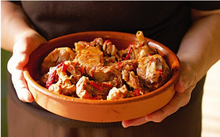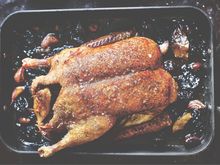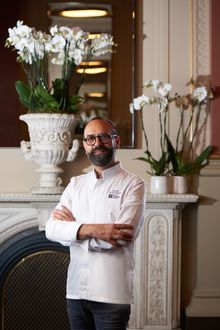 22 Sep 2022
22 Sep 2022

With Christmas on the horizon, iconic Spanish chefs José Pizarro and Omar Allibhoy have revealed some of the best-loved traditional foods that have become hallmarks of the festive season in Spain.
Festivities and celebrations in Spain are the source of many food traditions and dishes that are unique to the country, and influenced by its distinctive culture and produce. Both Pizarro and Allibhoy are Spanish natives who have set up acclaimed and successful restaurant groups in London and the UK, known for their commitment to showcasing the classic dishes and ingredients of Spain in contemporary-feeling Spanish restaurants including José, Pizarro, and Tapas Revolution. As proud ambassadors for the country and its food culture and as chefs, both have also written best-selling recipe books celebrating Spanish cuisine.
The traditions specific to Christmas time in Spain are numerous, and include classic dishes from roasted whole fish and suckling pig to sweet treats like turrón, the cake roscón de reyes and more. Christmas Eve, Christmas Day, New Year's Eve and New Year's Day also come with their own food traditions, as does the Epiphany, or Reyes Day, which celebrates the Three Wise Men's journey.
The festive feeling
“For me, Christmas means bringing people together to celebrate,” says Pizarro. “It's about spending time with my family and friends. Everything has to be simple and delicious.”
“Christmas in our family is a time for special meals, full of laughter and being together, seeing the cousins and uncles you don't get to see, catching up, playing games and being jolly,” says Allibhoy. “It's the perfect recipe to make memories. And for those of us who emigrated, coming back home for that is something we truly look forward to every year.”
Classic Christmas food in Spain
“For us Christmas lasts longer than in the UK, as our celebrations finish on the Epiphany, opening the gifts that the Three Wise Men brought from the East. All of the key dates around Christmas are opportunities to celebrate and food takes centre-stage in our celebrations. We love a well set table full of Spanish delicacies.
“In our home in the Sierra de Gredos of Madrid, Christmas Eve and Christmas Day always start with an array of Ibérico pork charcuterie, Galician shellfish and my grand uncle's speciality brown or spider crabs al Cava,” continues Allibhoy. “Then starters will be served. There is always a choice of either courgette and almond soup or Madrid-style braised red cabbage.
“Then for main there will be a large grouper baked in the oven with a simple garlic and olive oil dressing. To finish off a big tray of Spanish turrones, which is a type of nougat with almonds or nuts, polvorones, a crumbly shortbread-type cake, and other regional specialities like empiñonados, pine nut marzipan, tejas, canutillos and more.”
Christmas Eve is the big celebration,” says Pizarro, who is from the region of Extremadura, near Andalusía in the south of the country. “On Christmas Eve we go to the market to see what ingredients look amazing for Christmas Eve and Christmas Day.
“It's all about seafood to start. We usually have a spread of tapas that includes prawns, langoustines and octopus – whatever we picked up at the market that day. The main course on Christmas Eve is usually a big fish; maybe a sea bream, sea bass, or besugo al horno. It has to be a big whole fish served in the centre of the table.
“We always have tapas before the caldereta de cabrito on Christmas Day. Black pudding, orejas and offal are normally on the Christmas Day tapas menu. On Reyes Day we love to have suckling pig, which is placed as the centrepiece on the table and is a real treat.”
Christmas tipples
“As far as drinks are concerned, we always have to have a good sherry,” says Pizarro. “I am always discovering new wineries for outstanding sherries and I like to bring some of these new wines to the Christmas table for my family to try. It has to be good but good doesn't mean expensive. We always have a good Manzanilla and a Pedro Jiménez with our tapas. Cava is a part of all of our Christmas celebrations, and a red and white wine are always on the table.”
“To drink, it has to be a good celebratory Cava,” says Allibhoy.
The cheese board
Cheese is very important to us. We always include cheese as part of the Christmas celebrations,” says Pizarro. “Torta del Casar cheese always features – it's a cheese from Extremadura. We also have a goat's cheese from my local area, served with little toasts and membrillo or a tomato marmalade that I make for Christmas using local tomatoes.”
“In my house we have a metre-long cheese board,” says Allibhoy. “This is generally full of cheese from the Canary Islands like Payoyo and Majorero, which we have before the starters are served.”
It isn't Christmas without…
“It isn't a Spanish Christmas without turrón, a type of Spanish nougat, and polvorón, a sweet Spanish shortbread made with almonds,” says Allibhoy.
“I would say a very good jamón ibérico,” says Pizarro.
New Year's celebration
“Also important is New Year's Eve when we eat seafood and a wide range of tapas including a salmon, which I cure at home,” says Pizarro. “On New Year's Day, I always wake up with a glass of cava and orange juice to ring in the new year!”
“New Year's Eve takes place at my parents' home,” says Allibhoy. “On the menu is smoked salmon with my mum's mayonnaise, boiled prawns, acorn-fed jamón ibérico, white asparagus pudding and an array of canapés. For starters, some years my mother cooks a mushroom and langoustines fricando or if I cook I would normally do lobster bisque. For main we always go for a whole slow roasted drunken brandy turkey.”
“For New Year's Day we would again go out to a traditional asador restaurant, and since part of my family comes from Burgos we have to have some morcilla de Burgos with piquillo peppers and a slow-roasted milk-fed lamb, served with poor man's potatoes.”
Other dishes and traditions
The Twelve Grapes
“On New Year's Eve when the midnight bells chime, we have to eat a grape for every chime,” says Pizarro. “It's something we have done since we were children and I love the tradition.”
“The Twelve Grapes is something every Spaniard has to have no matter where he is in the world,” says Allibhoy.
Caldereta de cabrito
“What we love to eat on Christmas day is baby goat, or kid,” Pizarro says. “The dish is called caldereta de cabrito and it is very popular in my home region of Extremadura. It's a kind of stew made with dry peppers and wine cooked over a medium heat, for less than an hour as the meat is so tender.”
Roscón de Reyes
“Reyes is another word for Epiphany, when the Three Kings bring presents for children in Spain,” says Pizarro. “On Reyes evening we have fish and seafood as well as roscón de reyes, a kind of sweetened circular bread, which I have seen is available in some places in the UK now.”
Tips and recipes
Drunken brandy turkey
“I only eat roasted turkey once a year, but it has to be our family recipe as it is the only moist turkey I have ever tried,” says Allibhoy. “With the help of a syringe, we inject it with half a bottle of Spanish brandy 24 hours in advance and the results are unparalleled. “If anyone tries it, they will never go back to eating turkey any other way.
Kid goat stew, by José Pizarro
Serves 8 to 10
Ingredients:
- 1 whole kid (approx. 5 kg), jointed
- sea salt and freshly ground
- black pepper
- 6 tablespoons extra virgin olive oil
- 4 choricero peppers, or 1 tablespoon pimentón de la Vera dulce (mild
smoked paprika)
- 4 garlic cloves, peeled
- 1 bottle dry white wine
- 2 bay leaves
Method:
- Season the kid with salt and pepper. Heat the oil in a big casserole over a medium to high heat, add the kid and the peppers and fry until the joints are browned.
- Remove the peppers and pound them in a pestle and mortar with the garlic cloves to make a paste. (If you are using pimentón instead of the peppers, simply add this to the mortar with the garlic.) Mix the wine with this paste and stir it into the meat.
- Add the bay leaves, then cover the casserole with a close-fitting lid and simmer slowly for about 1 hour, until the kid is tender. Add water or more wine from time to time to keep the meat moist.
- Serve with a green salad. For my dressing I use one part honey, one part Moscatel vinegar and two parts extra virgin olive oil.
ENDS
Notes to editors:
Contact:
For further information / high-res images please contact:
Margaux Bourgeois
NOTES TO EDITORS
José Pizarro
José Pizarro is a chef and restaurateur from Extremadura in Spain. Founder of restaurants José, Pizarro, José Pizarro, Poster Bar and José Pizarro at the RA in London and The Swan in Esher, Pizarro is also a regular guest on TV shows including Saturday Kitchen, and the writer of many best-selling cookbooks, the most recent of which is titled The Spanish Home Kitchen: Simple, Seasonal Recipes and Memories from My Home.
Omar Allibhoy
Madrilenian chef Omar Allibhoy is best known as the founder of Tapas Revolution, a restaurant group with 10 UK locations that serve classic, accessible tapas to a growing audience of Spanish food lovers across the country. Also a regular on British television, Allibhoy has written cookbooks including Tapas Revolution and Spanish Made Simple: 100 Foolproof Spanish Recipes for Every Day.
About ICEX and Foods and Wines from Spain:
ICEX Spain Trade and Investment (ICEX) is the Spanish Government Agency that promotes exports and investment, enhances competitiveness, and assists Spanish businesses in international markets. Foods and Wines from Spain is ICEX's brand for a wide range of promotional activities designed to inform trade and consumers about Spain's wines, food products and gastronomy. For more information about Foods and Wines from Spain, please visit www.foodswinesfromspain.com
#alimentosdespaña is the Ministry of Agriculture, Fisheries and Food brand for the promotion of Spain's identity through its food and agricultural riches. The history of Spain has been shaped by the contributions of different cultures over the centuries. One of the richest manifestations of this heritage is what is known as "the Mediterranean Diet'', which is a model diet that is varied, tasty and balanced. Approved by UNESCO as an Intangible Cultural Heritage of Humanity. For more information about #alimentosdespaña, please visit www.alimentosdespana.es
SPAIN FOOD NATION
Passion is for real in Spain. It's in our sun. In our roots and in the roots of what we produce. In what we cultivate. In our efforts to make sure everything grows to be the best it can be. Spanish passion shows itself in our pride in a job well done. This pride is reflected by our producers who have taken centuries-old traditions and transformed them into their modern 21st century versions. Pride in not forgetting what is good. The idealism that keeps us going when everything else stops. Spanish passion is in our land. In how we take care of it. Spain extends this passion to your food and wine.
Eat, Drink Spain. #SpainFoodNation






